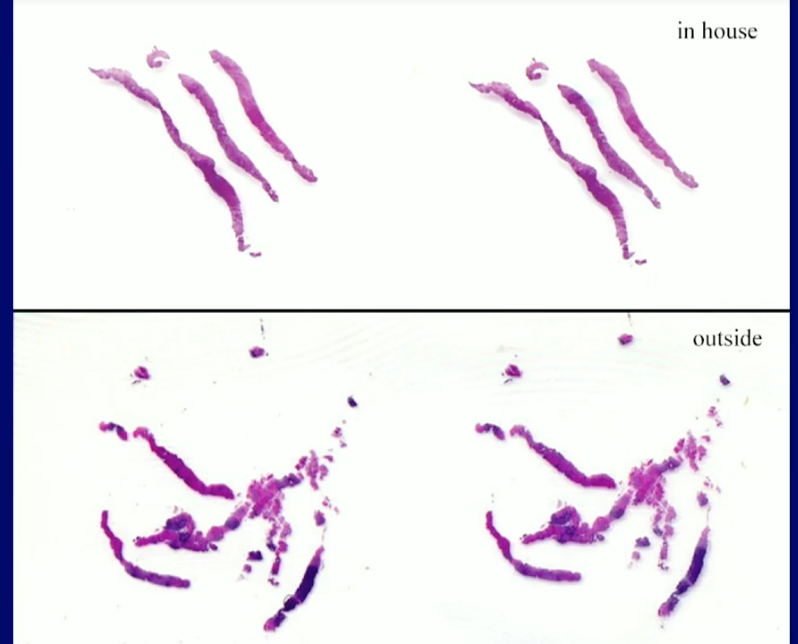Francisco G. La Rosa, MD, presented “Second Opinion Diagnosis in Prostate Pathology” during the 29th Annual International Prostate Cancer Update on January 26, 2019 in Beaver Creek, Colorado.
How to cite: La Rosa, Francisco G. “Second Opinion Diagnosis in Prostate Pathology” January 26, 2019. Accessed May 2025. https://grandroundsinurology.com/second-opinion-diagnosis-in-prostate-pathology/
Second Opinion Diagnosis in Prostate Pathology
Francisco G. La Rosa, MD, discusses how poor preparation of biopsy and prostatectomy specimens, as well as pathologists’ misreadings, can lead to significant discrepancies in the diagnosis of prostate cancer. He emphasizes the importance of reevaluation by in-house urologic pathologists of all outside specimens before evaluating treatment options for patients.
Abstract:
Prostate cancer (PCa) is one of the most common male diseases in the USA. The gold standard for PCa diagnosis is based on a careful and comprehensive histopathologic examination of prostatic tissue to deliver allied specialty colleagues with the correct information. This allows them to tailor the most appropriate therapeutic procedures to individual patients.
An accurate diagnosis is not only based on the expertise of the pathologists recognizing PCa under the microscope, but also on the support of a proficient histology laboratory with enough experience in the preparation of biopsies and prostatectomy specimens.
Pathologists need to keep updated in the constant changes in PCa classification and in the evaluation of other specific tumor features. They also need to maintain a permanent and close professional collaboration with their clinical, oncology, and surgical colleagues to construct sound clinical-pathological correlations that can secure the right care for their patients.
An accurate pathology diagnosis relies on a precise evaluation of tumor grading, together with important features such as perineural invasion, extraprostatic extension, lymphovascular invasion, surgical margins, invasion of seminal vesicles, therapy effect, etc., as well as the assessment of metastatic disease in lymph nodes and other organs. This is in conjunction with the implementation of special histological stainings for the proper identification of PCa. In many cases, due to poor histopathological preparations and the pathologist’s lack of proficiency, we find significant discrepancies in the diagnosis of PCa that may lead to inadequate therapeutic procedures.
We have found significant discrepancies between general pathologists outside our institution and our in-house pathologists [1], with the most important discrepancies involving tumor undergrading predominating above overgrading, and in the differentiation between primary and secondary PCa grades. Outside pathologists also failed to report important features relevant to the patient’s prognosis, such as perineural invasion, extraprostatic extension, and surgical margins.
Since histopathological evaluation is a critical factor for appropriate treatment selection, we recommend that a reevaluation by in-house urologic pathologists should be performed in all outside specimens before patients are evaluated for treatment in any given institution.
About the International Prostate Cancer Update
The International Prostate Cancer Update (IPCU) is an annual, multi-day CME conference focused on prostate cancer treatment updates. The conference’s faculty consists of international experts, and the event caters to urologists, medical oncologists, radiation oncologists, and other healthcare professionals. Topics encompass prostate cancer management, from diagnosis to treating advanced and metastatic disease. Dr. La Rosa presented this lecture during the 29th IPCU in 2019. Please visit this page in order to learn more about future IPCU meetings.
ABOUT THE AUTHOR
Francisco G. La Rosa, MD, FCAP, serves as an Associate Professor in the Department of Pathology at the University of Colorado Anschutz Medical Campus and is a distinguished member of the University of Colorado Cancer Center. He originally graduated as an M.D. in Lima, Peru, with Residency in Clinical Pathology, followed by Residency in Anatomic and Clinical Pathology at the “University of Colorado.” He is Board Certified in anatomic and clinical pathology, and specializes in genitourinary, renal, and heart pathology. He is also recognized as an expert in pathology informatics.
Dr. La Rosa actively engages in clinical practice, research, and education with over 100 publications in refereed journals. His primary hobbies include photography and videography, both of which he has utilized for educational purposes by creating several websites dedicated to the teaching of pathology.
Dr. La Rosa holds memberships in several national and international organizations, including the College of American Pathologists, American Urological Association, Peruvian American Medical Association, Catholic Medical Association and Association for Pathology Informatics. His research involvement extends to collaboration on various research grants in genitourinary pathology, and he serves as a member and study coordinator at the Southwest Oncology Group (SWOG), Genitourinary Committee. Most notably, he collaborates closely with Dr. E. David Crawford and his team on cutting-edge technology for diagnosing and treating prostate and urinary cancers. As a faculty member of Grand Rounds in Urology, he actively participates in various innovative educational activities within the field of urology.
As a graduate from the Teaching Scholar Program at the University of Colorado, Dr. La Rosa imparts his knowledge to medical students, as well as pathology residents and fellows. His commitment to excellence in teaching has earned him several recognitions.
Beyond national borders, Dr. La Rosa is recognized as an Honorary Professor at the Medical School Hipolito Unanue of the National University Federico Villarreal in Lima, Peru. He also serves as the co-founder and current Administrator of the Asociación Iberoamericana de Telesalud y Telemedicina (AITT) and holds the position of founder and Editor-in-Chief of the international journal Revista de la AITT (ISSN 2411-3840). The mission of these endeavors is to promote and coordinate programs and activities in telehealth and telemedicine among Latin American countries. Additionally, he serves on several international scientific committees and editorial boards of scientific journals, further contributing to the global advancement of pathology.

